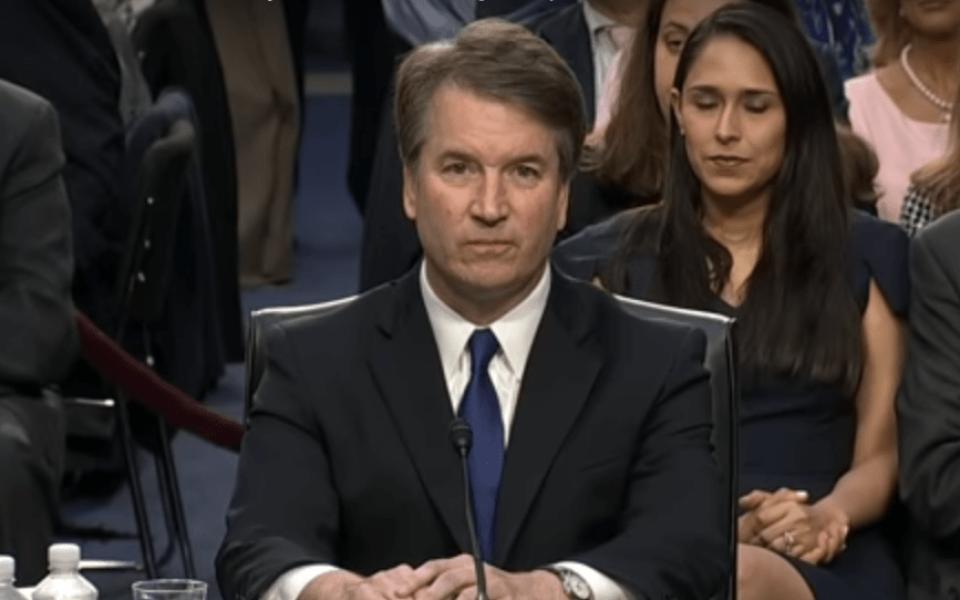Stealing a phrase from Silent Sam supporter Thom Goolsby, Sen. John Cornyn (R-Texas) described Brett Kavanaugh’s Supreme Court confirmation hearing as “mob rule,” while Democratic lawmakers attempted to stall the process until they have a chance to review documents related to the nominee’s service in the Bush White House.
It was an unprecedented breakdown in decorum for the normally august Senate Judiciary Committee, with periodic interruptions from protesters and Democratic lawmakers cutting in to request adjournment to executive session as Chairman Chuck Grassley stumbled through platitudes welcoming the nominee’s family and praising his qualifications.
Democrat committee members contend they still haven’t seen 90 percent of the documents relevant to Kavanaugh’s career, many of which related to his service as staff secretary to President George W. Bush, and that they received of thousands of pages on them Tuesday morning that they didn’t have an opportunity to review. (Another 42,000 pages were released on Wednesday that are stamped “confidential.”) Sen. Grassley (R-Iowa) and other Republican lawmakers have argued that the documents from Kavanaugh’s stint as staff secretary will shed little light on his judicial philosophy since his job was largely passing on information from other advisors, and that their release could compromise the president’s ability to receive candid advice from staff.
“Whether it’s not seeing 90 percent of the resume of the gentleman before us or 50 percent or 40 percent, that should come within time,” Sen. Cory Booker (D-NJ) told Grassley, arguing to delay the hearing. “And there is no jeopardy when we have a lifetime appointment. He will be there, should he be confirmed, for decades and decades and decades. Waiting another week or five days or two weeks for those documents which you yourself have requested…. I don’t understand what the rush is given all that is at stake.”
Even some progressive activists have questioned why Democrat lawmakers are staking their fight on the withheld documents. But short of walking out on the hearings, procedural questions are the only card the minority party has to assail Kavanaugh’s nomination.
What we already know about Kavanaugh — who started his career working under the special prosecutor on the Clinton impeachment proceedings, volunteered for the legal team that helped Bush survive the disputed 2000 election and then performed an about-face on the issue of executive power — and the man who is appointing him should be enough to know he isn’t fit for service on the highest court on the land.
Sen. Dianne Feinstein (D-Calif.), the ranking member and a veteran of eight previous confirmation hearings, got closer to the marrow than most of her colleagues.
“I think these are very unique circumstances,” Feinstein said. “Not only is the country deeply divided politically, we also find ourselves with a president who faces his own serious problems. Over a dozen cabinet members and senior aides to President Trump have resigned, been fired or failed their confirmations under clouds of corruption, scandal and suspicion. The president’s personal lawyer, campaign manager, deputy campaign manager and several campaign advisors have been entangled by indictments, guilty pleas and criminal convictions. So it’s this backdrop that this nominee comes into when what we’re looking at is, is he in the mainstream of American legal opinion and will he do the right thing by the Constitution?”
Peter Shane, a law professor at Ohio State University who has been called by the Democrats as a witness in the confirmation hearings, told Robin Young of WBUR’s “Here & Now” that the 42,000 pages withheld from public review might reveal Kavanaugh’s opinion of so-called “signing statements,” which President Bush used in signing legislation to indicate which parts of the bills he believed to be an unconstitutional infringement on executive authority.
“So, it would be as staff secretary, it could be that Mr. Kavanaugh, as he would then be, might have contributed to the analysis behind these theories, he may have advocated them, or he may just have gone along with them,” Shane said. “We don’t know. But they are of a piece with the positions he has taken on the president’s authority over the executive branch.”
There’s already plenty in the public record to indicate that Trump’s nomination of Kavanaugh amounts to an insurance policy against impeachment or indictment following the conclusion of the Mueller investigation.
“There’s also the question [of] whether presidents have the power of self-pardon,” Shane said. “President Trump has said he absolutely has that power. I think there’s every reason to think he does not, but again, if you believe as Judge Kavanaugh wrote in a law review article that presidents should be able to do their jobs with as few distractions as possible, one way to remove distractions is to assure that if need be, they can always pardon themselves.”
Join the First Amendment Society, a membership that goes directly to funding TCB‘s newsroom.
We believe that reporting can save the world.
The TCB First Amendment Society recognizes the vital role of a free, unfettered press with a bundling of local experiences designed to build community, and unique engagements with our newsroom that will help you understand, and shape, local journalism’s critical role in uplifting the people in our cities.
All revenue goes directly into the newsroom as reporters’ salaries and freelance commissions.


Leave a Reply